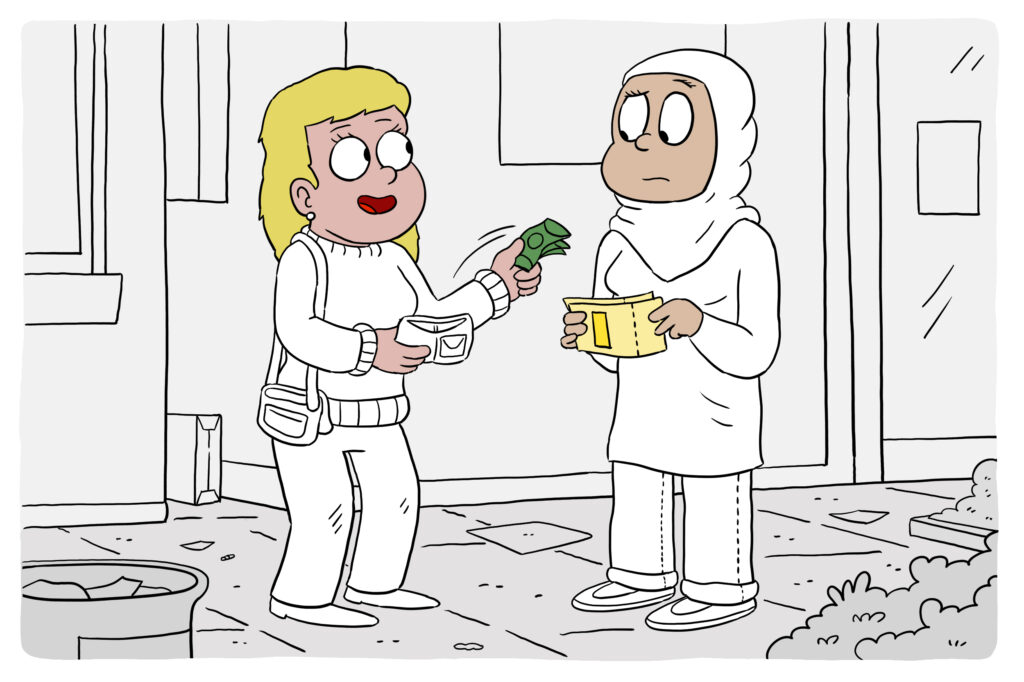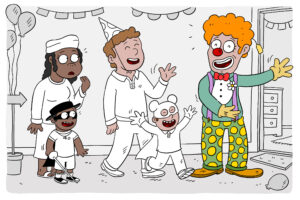Hanan is organizing a children’s party at the Efteling for her little daughter Dilan, whose birthday was last week. This is Hanan and her family’s fourth summer in the Netherlands, and this seemed like a great opportunity to celebrate. They live near the Efteling. On the invitation, Hanan asked all the children to gather in front of the entrance. She had ordered the tickets earlier and they are ready to go.

Anna comes to bring Fleur. The latter brings a beautiful balloon and a present. The girls hug each other. Anna asks Hanan what time she can pick up Fleur again and grabs her purse. “How much do you get from me for the ticket? Or will you send a ticker?”
Anna is startled. “I invited Fleur to the children’s party because it’s a party!”, she thinks. “But will Anna reimburse the ticket, how strange! After all, it’s our treat…. otherwise I wouldn’t have invited her, would I?” She is a little offended, but doesn’t show it of course. With her hands, she averts the offer, smiles and looks away. “Don’t worry,” she says quickly and greets another parent.
Anna thinks Hanan is reacting strangely and she is not clear. “Fleur has been invited to a birthday party at the Efteling – super sweet, but how expensive! I barely know Hanan, so I’d like to pay for Fleur’s ticket. I feel just a little more comfortable with that.”
Where is the connection?
In the Netherlands, it is very common to share the bill. Tikkie was invented here! And the English talk about ‘going Dutch’, sharing the bill jointly. Very practical and especially no loose ends! For people from a we-culture is very uncomfortable. In an I-culture it’s just clear. Everyone pays for themselves.
As a result, Fleur’s mother ignores the hospitality Hanan wants to show. She finally has the opportunity to do so, and she is proud. She spares no expense. Anna’s question is very direct and insulting to Hanan. Does she think Hanan is not willing to do this for her daughter? Or that she can’t afford it? All sorts of feelings suddenly come into play for Hanan. But she doesn’t show them in a direct way. To prevent either party from losing face, she avoids further details and says something like “we’ll see later, don’t worry, or next time.
Then the trick is to listen between the lines. Anna might feel Hanan’s shame. Or might appreciate the pride. But that is only after she has asked the question. Even better is to leave this alone and come back to it separately later, or ask now if there is anything more she can do. With that question, Hanan can do much more than Anna thinks. For example, answer that this way everything is fine, or that she is very happy for Fleur to be spoiled by Hanan and Anna today.
That might leave Anna with the idea that she owes Hanan because of that expensive Efteling ticket? But that’s her problem. A good guest knows how to enjoy hospitality unconditionally. Cost is not important in a we-society and certainly not how it is distributed.
In short
For Anna:
- Accept that Hanan comes from a we-society.
- Giving and receiving hospitality are very important.
- Do not set conditions by wanting to share the bill, for example, and certainly not in a direct question or proposal in front of others.
- Be extra alert to the other person’s body language
- Enjoy the hospitality…
For Hanan:
- Accept that Holland has a distinctly I culture.
- In the Netherlands, with is used to paying the bill yourself unless clear agreements are made.
- Avoid uncomfortable situations by stating the intention at the time of the invitation.
- Try answering directly, without loose ends. The Dutch are used to being addressed directly.
Want to read more about culture dimensions?
Important to know:
This anecdote is based on stories shared with us. Connect2Us strives to highlight the dilemma from both sides and not to label people or suggest that one or the other should behave differently. Awareness by those involved is enough to move toward each other. Without pretending to be very different. Connect2Us aims to help readers recognize and avoid prejudice. Read about prejudice, discrimination and racism here.

